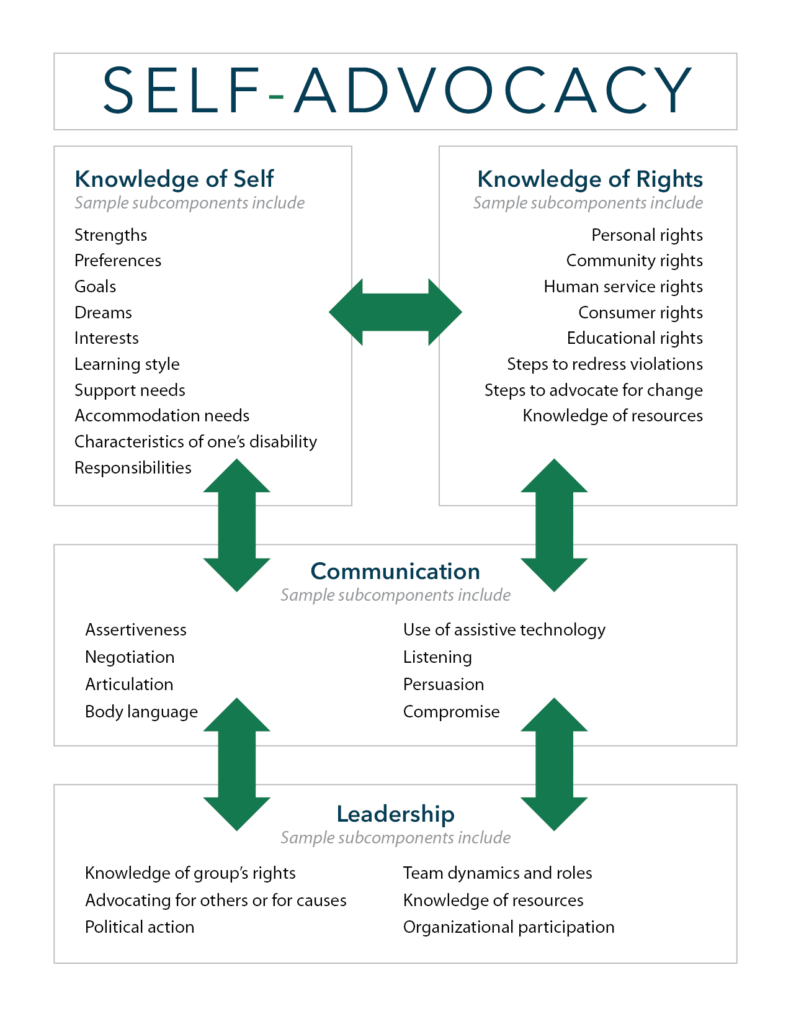For Youth & Families
CAPE-Youth is primarily focused on helping state policymakers develop and implement policies and programs to support youth and young adults with disabilities (Y&YADs). However, if you are a young person with a disability or a family member, there are still many ways to create change in your life.
If you have questions about any of the terms you encounter on this page, please refer to our Definitions page.
For Youth
Self-Advocacy
As youth get older they begin to assume greater responsibility for planning their future and identifying goals and needs for leading a satisfying and fulfilling life. Developing self-determination and self-advocacy skills can help Y&YADs speak up for themselves, ask for what they need and want and participate in making their own life decisions. Self-advocacy refers to:
- Understanding one’s disability;
- Being aware of one’s strengths and weaknesses;
- Being able to express the need for accommodations;
- Acting with agency and making choices and decisions free from external influence or interference;
- Setting goals and having and obtaining the skills to achieve those goals; and
- Understanding one’s rights under the law.
You can find programs in your state that teach self-advocacy and other leadership skills by reviewing the Youth Development & Leadership section of CAPE-Youth’s program scan.
Engaging in the Policymaking Process
Y&YADs play an important role in public policy. They have a good understanding of their needs, desires, and challenges. When they communicate these needs, desires, and challenges to federal, state, and local leaders – through a process called legislative advocacy – they can make sure their voices get heard and that policies and programs better meet the needs of Y&YADs.
To engage in legislative advocacy, youth can start by identifying their local and state representatives.
- Mayors, city council members and school board members can be found on a city’s website;
- State senators and representatives can be found on the map below; and
- National representatives can be found on the U.S. House of Representatives and U.S. Senate websites.
Once you have identified your representatives, you can:
- Develop an outreach plan using the National Consortium on Leadership and Disability for Youth’s Legislative Advocacy Guide;
- Schedule meetings and talk to your representatives about issues you find important;
- Develop relationships with representatives and their staff; and
- Engage with local advocacy groups.
CAPE-Youth is in the process of developing a toolkit to help Y&YADs develop the skills to direct their own futures, including engaging in the policymaking process. Keep monitoring this page for additional information!
In addition, CAPE-Youth frequently asks for input from Y&YADs on our work. If you are interested in participating, please email us!
Additional Resources for Youth:
Websites and Webpages
FAQs, Fact Sheets and Primers
Guides and Toolkits
- By Youth, For Youth: Employment
- Do I Tell My Boss? Disclosing My Mental Health Condition at Work
- Hitting the Open Road After High School
- How to Keep A Job: The Young Adult’s Guide
- How to Request Accommodations
- Making the Move to Managing Your Own Personal Assistance Services (PAS)
- Telling Your Money What to Do: The Young Adult’s Guide
- Vocational Rehabilitation: A Young Adult’s Guide
For Families
Supporting Y&YADs
Family engagement in the lives of Y&YADs is a key predictor of future success in education and employment. Family roles in the life of a young person with disabilities include providing support, offering guidance, and advocating for their young person. According to research commissioned by the U.S. Department of Labor’s Office of Disability Employment Policy, students whose parents are involved in their career exploration and planning are more actively engaged in school, earn higher grade point averages, are more open to change, attend school regularly, and are more resilient when facing challenges.
Family members can support their Y&YAD by:
- Communicating and modeling high expectations for what youth can do and achieve in life;
- Supporting youth’s learning through active involvement in their education;
- Participating with the youth in youth-led IEP and transition meetings;
- Building advocacy skills to direct and facilitate access to services and opportunities;
- Serving as an advocate and then coaching youth to advocate for themselves;
- Developing their own, as well as their youth’s, understanding of high school, post-secondary and employment expectations, including relevant policies, rights and responsibilities;
- Assisting youth in developing self-determination, career preparation, and independent living skills; and
- Developing the family’s own social capital and knowledge to navigate transition.
Parent Training and Information Centers (PTIs) and Community Parent Resource Centers (CPRCs) can assist family members in supporting their Y&YADs. PTIs and CPRCs are federally-funded centers located in all states and territories that provide free services to help parents participate effectively in their children’s education and development, including around transitions. You can find your nearest Center here.
Engaging in the Policymaking Process
Family members can engage in the legislative process in the same way as youth (see above). Yet there are also specific opportunities for family members to get involved. Many states have working groups, committees or Councils – such as the Employment First Georgia Council, created by Georgia House Bill 831 – that include family members of individuals with disabilities as required members.
Additional Resources for Families:
FAQs, Fact Sheets and Primers
Guides and Toolkits
Locate Your State Representative/Senator
Click the map or links below to find your state representatives and senators.
See below for an alternate view.

